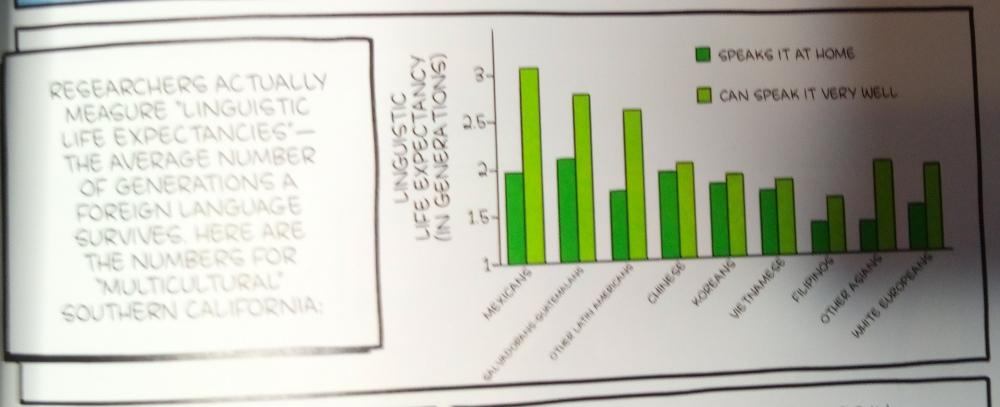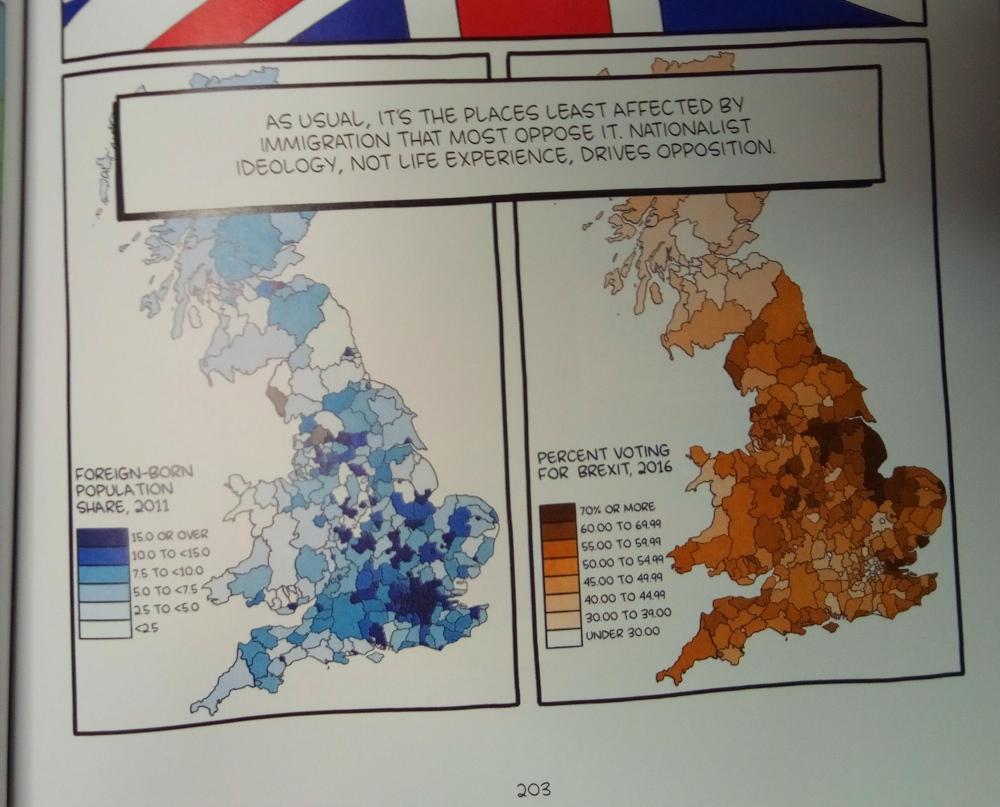I’ve been interested in Bryan Caplan’s Open Borders: The Science And Ethics Of Immigration since I first heard about it. Caplan is also the author of The Case Against Education (my review). As you can see, this guy delights in tipping over sacred cows. Do not simply write this guy off as a nutter, however. Bryan Caplan is a smart, creative thinker who has thought about these issues a lot more than you likely have.
Open Borders is an easy to read book because despite the author admitting, "Marketing’s not my specialty to be honest," (p193) that is contradicted by the very canny use of a format my library categorizes as an "Adult Graphic Novel". The artist, Zach Weinersmith, does a superb job of illustrating the graphic part in a clear but pleasant and non-threatening way. His normal comic, SMBC, is pretty good.
I liked this book’s message. Of course I’m already on board. Caplan didn’t need to convince me. I’ve long believed that oppressive immigration controls will be viewed by future generations like slavery is by ours. Chapter one is titled "Global Apartheid" and that is exactly what immigration controls are. I’m old enough to remember when the Berlin Wall caused consternation to "free" people. I don’t see any conceptual difference between that wall and the wall at the bottom of San Diego County — some oppressive (to those directly involved) government wants to limit some people’s freedom to cross some line. From Mexico’s point of view they’ve trapped people in disadvantageous economic circumstances without having to pay for the wall. The people involved will have the exact same attitude about a wall whether crossing one in 1980s Germany or the Sonoran Desert in the 21st century.
And what good does this wall do? Americans tend to see the (southern) border wall as a way to keep poor people from "stealing" "our" … Our what? What exactly? Our stuff? Our land? Our fair women’s virtue? What?
The big one you hear most often is: They’re stealing our jaaaahhwbuzz! When I go to Home Depot and buy a 2x4 am I stealing their lumber? Yet when a poor bracero goes to Home Depot to buy some dollars (with his labor), suddenly he’s "stealing" someone’s job. Nobody worries about the lumber store that was charging double Home Depot’s prices nor feels I’m "stealing" from those guys by shopping at the inexpensive place. It’s like Americans really aren’t all that into capitalism and free markets.
Caplan is an economist and though a lot of his calculations seem a bit difficult to believe, he is at least doing some math and not just having a feeling about it. By Caplan’s reckoning, the blanket embargo on the trade of labor is throwing away gazillions of dollars in lost opportunity. My eyes glaze over with such big numbers, but roughly, he believes that we’re talking about between 50% and 150% of global productivity that could be magically generated by removing labor market friction. In other words if the world’s output was 100 units of good stuff, without restrictive borders, the world good stuff output would be between 150 and 250 units. Everyone would effectively get a massive boost in standard of living.
Are these projections of massive economic improvement realistic? Well, it certainly leaves the clear impression that global productivity won’t tumble into a dark age because some foreign people are ready and allowed to work hard for your dollars.
An open labor market is sometimes considered overly idealistic, but I think of Japan’s Sakoku period from 1639-1853 when that country closed its ports to all commerce and interaction with all foreigners. That was overly idealistic. Maybe a feudal Japan frozen in time was nice for some Japanese for a while, but eventually they lagged severely behind in pretty much everything but anachronistic handicrafts. I see globalization, and especially the internet, like Perry’s steamships that are pretty much not going to take no for an answer.
Yes, there will be some losers. Let’s consider an example. Let’s say you’re an American welder. You can make great money working on American "defense" projects. You can make decent money working in America’s protected borders. But those illegal humans are stealing welding jobs! And if they’re allowed to just enter without restrictions, they’ll take all those difficult, dangerous jobs. But think about the alternative. The current situation protects some small number of native born welders. But that protection isn’t attractive in the world’s marketplace. That protection now limits those welders to "defense" projects and products that absolutely positively can not be economically shipped from China. Do you think that most welded joints in the USA today were welded by American welders? So American welding is already impoverished. What I don’t think people realize is that along with all that welding work that went to China, the USA also lost all the manufacturing engineers, factory management personnel, and other manufacturing ecosystem players.
So rather than feel sorry for American welders, I’m feeling more sorry for the manufacturing engineers and white collar staff whose jobs already are trivial to outsource anywhere. They must actually compete properly in the world market and these artificial borders are not really helping welding work stay in the USA. But in a deeper sense, they’re just adding big transaction costs to everything. I cringe to buy a vise or anvil that had to be shipped from China; something obviously stupid is going on there. Smarter would be for the Chinese to use Chinese anvils, and Americans to use American anvils. Artificial labor market barriers are all that prevent a sensible arrangement.
Consider the current fears about America’s military industrial complex being overly reliant on Chinese imports. In my opinion, this is a very real concern. That problem has exactly one solution — open borders. Why are there so many engineers designing hardware in Taiwan? Not because they’re better at it than their American professors, but because they have an electronics industry there. They have an electronics industry because their labor market contains more free market realism than in the USA. Bringing the cheap people here really solves a lot of problems for both the USA and the cheap people.
From Caplan’s perspective, opening borders is the right thing to do, but he admits that if you really, really must unfairly exploit other people, do it here! You can tax immigrants until they pay some UBI for all displaced native workers. Better than hiring people to shoot them at the border!
The economics seem like a slam dunk to me, and as I understand it, to 99% of economists. But some people believe this is not about the money. To some it seems reasonable to throw away trillions to protect some precious nebulous cultural identity. Whatever that is. Well I can tell you what that is in the USA — it is that immigrants built America. That is the true American ethos. To say immigrants are generally bad is an obscene misrepresentation of the facts.
Here is a depraved lunatic rejecting America’s heritage — specifically the mechanism by which America was made great:
"[Mexico] are sending people that have lots of problems, and they are bringing those problems to us. They are bringing drugs, and bringing crime, and their rapists."
I guess the tepid unconvincing counterargument to open borders is that sometimes immigrants do have children who are shitheads — I’m looking at you Mary Anne MacLeod. In fact, anti-immigrant sentiment among immigrants is pretty messed up and probably should not ever be taken too seriously. It blows my mind to hear Americans who are not descended directly from the original indigenous population complain about immigrants. Pissing off hypocrites is a great reason to open borders.

The book debunks a lot of myths about how immigrants behave. For example, naturalized Americans have a fifth of the incarceration rate of native born Americans. It really infuriates me to hear slanderous nonsense from parochial ignoramuses targeted at Hispanics in particular. I lived in California (and TX and FL) for a long time and Spanish speakers are, in my experience, polite, friendly, honest, and extremely hard working. The best honest reason most Americans could muster to keep them out is that Mexican laborers completely embarrass the native population’s laziness.

Caplan notes, "What’s special about Hispanics in places like California isn’t that they don’t learn English, but that they retain fluent [bilingual] Spanish for one extra generation." (p99) I attribute this to the fact that Mexicans seem to me to be much more family oriented than other Americans — something completely contrary to the idiotic stereotypes xenophobes have of them (and themselves).
The book talks a lot about what tech company HR people would call a "bad culture fit". It pragmatically singles out Islam fundies and tries to address the fear of their badness. I totally agree that they are odious but I can’t see how they are any more so than the democracy thwarting, anti-anti-fascist, trigger-happy, native fundies. I am less craven than the average America and so is Caplan — he states my exact position clearly: "Islamism barely scares me because I think westernization is quietly winning…" He goes on to say, "And will win faster if people stuck in closed societies can freely vote with their feet." (p151) If any culture wants to have a soft power culture war with rationalism, science, technology, human rights, justice, tolerance, First Amendment secularism, and freedom, please, Bring It On. The sooner we take the field, the sooner their righteous gods can send corrective lightning bolts to smite our apostasy… Or… Their 9th century thinking will quickly erode in the face of modernity. According to rumor, video games (including, ironically, Counter-Strike), Disney films, and Pr0n were all found in Bin Laden’s compound. I am satisfied with the odds here.
One superb rhetorical point Caplan makes is to just consider the US position on Canadian immigrants. Can anyone even mumble any kind of weird justification for keeping them out? Too much hockey? Curling? Justin Bieber? What could justify this? The answer is absolutely nothing! Once you acknowledge that, you start to realize that there may be some serious flaws in the USA’s attitudes toward immigration.
Caplan knows there are going to be some problems. But that is acceptable since there already are a lot of problems with the current system. His answer is what he calls "keyhole solutions", which are more targeted remedies instead of a blanket suppression of people’s ability to improve their lives by moving.
But some of his specifics hint that this will not be easy to sort out. Like the adorable suggestion on page 144 that immigrants should be required to pay, ONE THoUSanD DolLArS!!!

Bwahhwhaahhah. It’s like Caplan doesn’t realize that immigrants already are paying much more than that (I personally did anyway).
On page 147 he suggests charging foreigners a premium for education. As someone who used to work in a factory minting PhDs for people to hang up in their offices in China and Europe, this strikes me as a simple trade tariff. It’s rather poor reasoning to suggest that the students are not paying a massive premium already when they come here and work elite jobs for a fraction of their worth as what I call "grad student slaves".
If you penalize immigrants with uneven taxation as proposed on page 148, you’ll just get the same situation as what you have now - a black market in labor.
I find that anti-immigration sentiment is anti-correlated with exposure to foreigners. The book strongly hints at the same thing.

The main objection I can think of to opening the doors in a way that will encourage billions of people to all move to richer countries is that you will risk bringing billions of people up to American levels of environmental depravity. I understand that "keeping poor people poor" is a questionable way to fight global warming, pollution, deforestation, etc, but I’m not convinced that rich people are leading lives that can safely be led by all. Maybe the influx of people would generate some better thinking than rich countries have been able to muster so far. We could probably lower our carbon footprint by bringing slavery back too, but that’s a bad idea. For the same reason, global apartheid must also be a bad idea.
Here’s a good idea: explicitly scale immigration restrictions to environmental problems. This is fair and no different from, say, fishing limits. It’s a better policy to be free to fish but not destroy the fishing grounds, than to just ban fishing. By making immigration freedom a valid principle to take for granted but limiting people based on environmental capacity, you’d get a lot more enthusiasm poured into solutions for saving our planet.
Am I optimistic that any of this will ever happen? Not in my lifetime. The USA has a lot of ignorance, parochialism, meanness, hypocrisy, and irrationality. "Doing the right thing" for its own sake is not high on the American todo list. And even doing the right thing for obvious profit is not especially popular if it involves weird people with weird names wearing weird hats from far away. But good for Caplan for sticking his neck out to advocate for the right thing. The least I can do is stick my neck out by writing something like this that agrees with him. Let Americans judge us harshly — history will not.